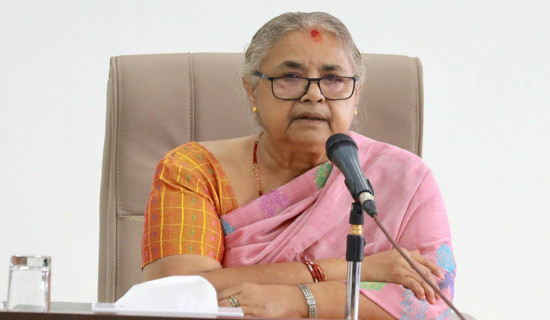- Thursday, 12 February 2026
Delicate Handling Of Foreign Affairs
We live in an era of history’s most critical juncture. The heightened geopolitical contestation among great powers has sounded worldwide alarm with fear of escalation of conflicts in various trouble spots. Even a slightest miscalculation may provoke war. Ukraine is the latest example of how a country that fails to read the mood and mind of powerful neighbour lands in trouble. While Ukraine war is fundamentally Vladimir Putin’s making by brazenly invading a small and sovereign neighbour. However, Ukraine President Volodymyr Zelenskyy, too, is partially responsible as he failed to gauze the intention and interest of big and powerful neighbour.
Kyiv under Zelenskyy moved too close to the Western security alliance and sought NATO membership, which Russia took as a serious threat to its national security. Zelenskyy’s hyper nationalism and Putin’s ego caused irreparable damage to both the countries. The war has already dragged on to the third year and there is no sign of its immediate end. Both the countries are losers. Ukraine lost because it has suffered heavily in terms of human and collateral damages. Russia has lost more than it gained. With the war continuing to drag on, it has bled Russian economy badly and Moscow has also earned bad reputation in international arena.
Military adventure
In fact, Ukraine invasion is calculative mistake of Russia. It attacked Ukraine to prevent NATO’s eastward expansion in Europe. This has caused more fear among other Russian neighbors which are looking to the west for their security and is likely to push them further to Western lap. Finland which remained neutral even during the height of the Cold War has now joined NATO fearing from Russia’s military adventure in the neighborhood. Sweden has followed suit. Georgia and other East European and Balkan countries are likely to join NATO. This is a big strategic loss to Russia.
These events should serve lesson to other countries as to how countries have to pay price when they fail to deal with neighbours wisely. The situation seeks countries to pay more attention to understand the sensitivities of the neighbours and accordingly deal. The closer the countries are, more issues and problem they face. Thus, the key challenge in foreign policy domain of any country is to deal with the neighbours and maintain cooperative relations with the neighbour. If the neighbour is a great power, the challenge is bigger because great powers always seek to treat its neighbourhood as their sphere of influence.
It goes well as long as one’s interests are harmonious with its powerful neighbour. But smaller and weaker nations find it more difficult and challenging to cope when their interests clash and collide with the interest of the powerful neighbors. Many countries in the world have faced this situation. When countries that are surrounded by two powerful countries that too are rival, they find it tough time to manage their relations. The situation of landlocked countries especially in Asia, Africa and Latin America is more painful. A total of 44 countries are landlocked of which 32 are developing countries.
Some countries are doubly landlocked — a land locked country surrounded by other landlocked countries. Liechtenstein and Uzbekistan are two doubly landlocked countries. Uzbekistan is surrounded by five landlocked countries that are Kazakhstan, Kyrgyzstan and Tajikistan, Afghanistan, and Turkmenistan. Liechtenstein is surrounded by two Europe’s landlocked countries — Austria and Switzerland. The doubly landlocked countries have more challenges than other landlocked countries as they have a little foreign policy choice and have to compromise with the interest of multiple countries. Nepal and Mongolia have unique geographic and geopolitical situation. Both the countries are surrounded by two big powers. Mongolia is surrounded by China and Russia, while Nepal is between India and China.
Nepal’s position is even more challenging and delicate as it has been surrounded by two rival powers. China and India have been diametrically opposed in terms of ideology and strategic perspective right after the end of Hind-Chin Bhai Bhai era in 1962 marked by bloody border war. China and India are competing powers and are in the two opposed poles in the present global order which is heading towards bipolar system. China itself leads one pole while India is in alliance with US-led pole. These two giants have contrasting interests. This makes Nepal’s foreign policy handling more challenging as Nepal neither can chose one at the cost of other nor can it afford to ignore them.
Dilemma
Right from the founding of modern state, Nepal has been facing such a dilemma in its foreign policy domain. Nepal’s founder Prithivi Narayan Shah is attributed to have aptly defined Nepal’s geopolitical position and given foreign policy basis more than two and half century ago. He said ‘Nepal is a yam between the two boulders’ referring its position between two great powers — British India in the south and China in the north. Similar situation continues even today and Nepal’s challenge is to maintain delicate balance between these two competing powers.
Cognizant of this harsh reality, Nepal has adopted non-aligned foreign policy paying due attention to the core interests of both immediate neighbours without jeopardizing Nepal’s own national interest. However, non-alignment does not mean remaining aloof and neutral when core international values and international laws are under assault. Nepal always takes side of truth against falsehood, justice against injustice and peace against war and has vocally stood in support of truth, justice, peace and virtue. Nepal wants peace in the country, in the region and in the world, which have been well reflected both in principle and conduct. Since the days are more challenging, Nepal will have to stick to its stated non-aligned foreign policy in its letter and spirit for global peace and order.
(The author is former ambassador and former chief editor of this daily. lamsalyubanath@gmail.com)

















